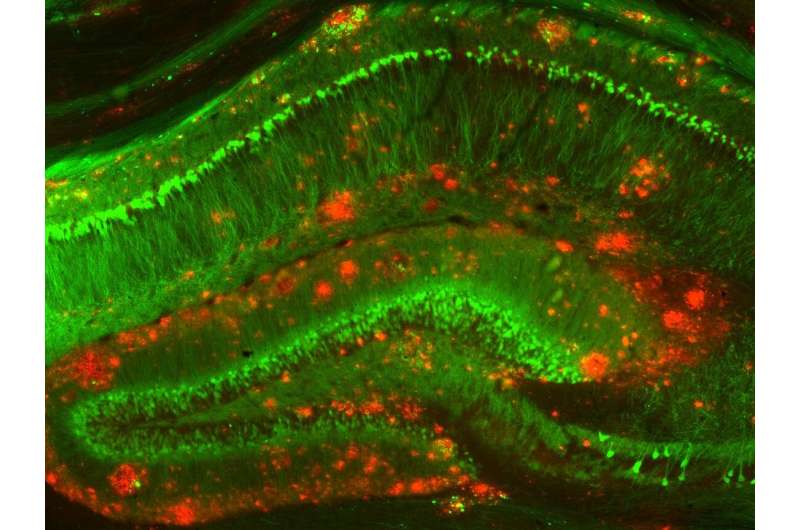This article has been reviewed according to Science X's editorial process and policies. Editors have highlighted the following attributes while ensuring the content's credibility:
fact-checked
peer-reviewed publication
trusted source
proofread
Abnormalities in neurodevelopment could lay the foundations for Alzheimer's disease

What if Alzheimer's disease left its mark on the embryo? Khadijeh Shabani and her colleagues from the Brain Development team led by Bassem Hassan (Inserm) at Paris Brain Institute show that the amyloid precursor protein (APP) has a specific biological role during neurodevelopment. It delays the onset of neurogenesis, i.e., the differentiation of stem cells into different nerve cell lineages.
Subtle disruptions of this mechanism could, in some individuals, induce vulnerabilities that only become apparent in adulthood after decades of biological stress. Alzheimer's disease could then be considered a neurodevelopmental disorder with a particularly late onset. These results are published in Science Advances.
In the cerebral cortex, neurogenesis—the formation of neural cells from stem cells—begins in the fetus from five weeks gestation and is almost complete by 28 weeks. It is a complex process with finely tuned mechanisms. "In humans, neurogenesis lasts particularly long compared with other species," explains Khadijeh Shabani, a post-doctoral researcher at Paris Brain Institute. "Neural stem cells remain in a progenitor state for an extended period. Only later do they differentiate into glial cells, astrocytes, or oligodendrocytes that will form the architecture of the brain and spinal cord."
Until now, researchers did not know how this balance between stem cell proliferation and differentiation into several cell types was regulated. Above all, they ignored whether the exceptionally long-time span of human neurogenesis could pave the way for vulnerabilities specific to our species, such as neurodegenerative diseases. To better understand how our brains are shaped during this crucial period, the team investigated.
APP, conductor of neuronal production
"We were interested in the amyloid precursor protein, or APP, which is highly expressed throughout the development of the nervous system," Hassan says. "It is an exciting research target as its fragmentation produces the famous amyloid peptides, whose toxic aggregation is associated with neuronal death observed in Alzheimer's disease. We, therefore, suspect that APP may play a central role in the early stages of the disease."
In many species, APP is involved in various biological processes, such as repairing cerebral lesions, orchestrating cellular response after oxygen deprivation, or controlling brain plasticity. It is highly expressed during the differentiation and migration of cortical neurons, suggesting an essential role in neurogenesis. But what about humans?
To track APP expression during human brain development, the researchers used cell sequencing data obtained from the fetus at ten weeks and then 18 weeks gestation. They observed that the protein was first expressed in six cell types, then, a few weeks later, in no less than 16 cell types. They then used the CRISPR-Cas9 genetic scissors technique to produce neural stem cells in which APP was not expressed. They then compared these genetically modified cells with cells obtained in vivo.
"This comparison provided us with valuable data," Shabani explains. "We observed that in the absence of APP, neural stem cells produced many more neurons, more rapidly, and were less inclined to proliferate in the progenitor cell state." Specifically, the team showed that APP was involved in two fined-tuned genetic mechanisms: on the one hand, canonical WNT signaling, which controls stem cell proliferation, and AP-1 activation, which triggers the production of new neurons. By acting on these two levers, APP is able to regulate the timing of neurogenesis.
Human neurogenesis, all too human
While the loss of APP strongly accelerates brain neurogenesis in humans, this is not the case in rodents. "In mouse models, neurogenesis is already very fast—too fast for APP deprivation to accelerate it further. We can imagine that the regulatory role of this protein is negligible in mice, while it is essential in the neurodevelopment of our species: To acquire its final form, our brain needs to generate huge quantities of neurons over a very long period, and according to a definite plan. APP-related abnormalities could cause premature neurogenesis and significant cellular stress, the consequences of which would be observable later," suggests Hassan. "Moreover, the brain regions in which early signs of Alzheimer's disease appear also take the longest to mature during childhood and adolescence."
What if the timing of human neurogenesis was directly linked to the mechanisms of neurodegeneration? Although neurodegenerative diseases are generally diagnosed between the ages of 40 and 60, researchers believe that clinical signs appear several decades after the onset of decline in certain neuronal connections. This loss of connectivity may itself reflect anomalies at a molecular scale present from childhood or even earlier.
Further studies will be needed to confirm that APP plays a central role in the neurodevelopmental disruptions that pave the way for Alzheimer's disease. In which case, "these disturbances lead to the formation of a brain that functions normally at birth but is particularly vulnerable to certain biological events—such as inflammation, excitotoxicity or somatic mutations—and certain environmental factors such as a poor diet, lack of sleep, infections, etc.," adds the researcher. "Over time, these different stresses could lead to neurodegeneration—a phenomenon specific to the human species and made particularly visible by the increase in life expectancy."
More information: Khadijeh Shabani et al, The temporal balance between self-renewal and differentiation of human neural stem cells requires the Amyloid Precursor Protein, Science Advances (2023). DOI: 10.1126/sciadv.add5002. www.science.org/doi/10.1126/sciadv.add5002.




















